Is Quinoa Good For Weight Loss? Everything You Need To Know 2024
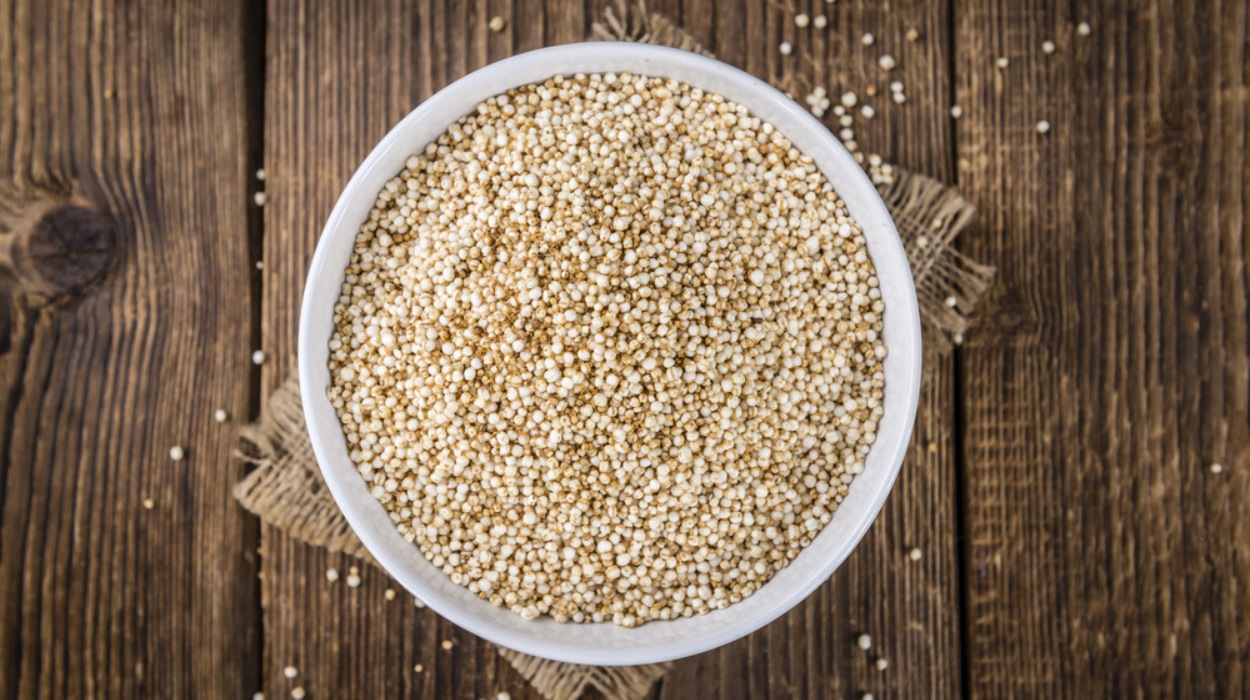
If you’re trying to lose weight, you might wonder if plant foods like quinoa can support this. This pseudo-grain is popular as an alternative to traditional grains like rice and wheat. This is mainly because of its impressive nutritional profile, and it is naturally gluten-free.
Quinoa is a nutritional powerhouse, rich in protein, dietary fiber, vitamins, and essential minerals.
But the key question remains: is quinoa good for weight loss, and how much should you eat to get the benefits? We’ll delve into the science behind quinoa’s weight loss potential while offering practical options for eating quinoa.
Is Quinoa Good For Losing Weight?
Quinoa can be supportive for weight loss when added to a balanced diet.
Its high protein and fiber content can increase feelings of fullness, supporting appetite control.
For losing weight, keep portions balanced, approximately half a cup per serving.
Quinoa is versatile and can be enjoyed in various meals throughout the day. However, remember that quinoa alone won’t cause weight loss. The key to successful weight loss with quinoa lies in an overall balanced diet and an active lifestyle.
Is Quinoa Good For Weight Loss?
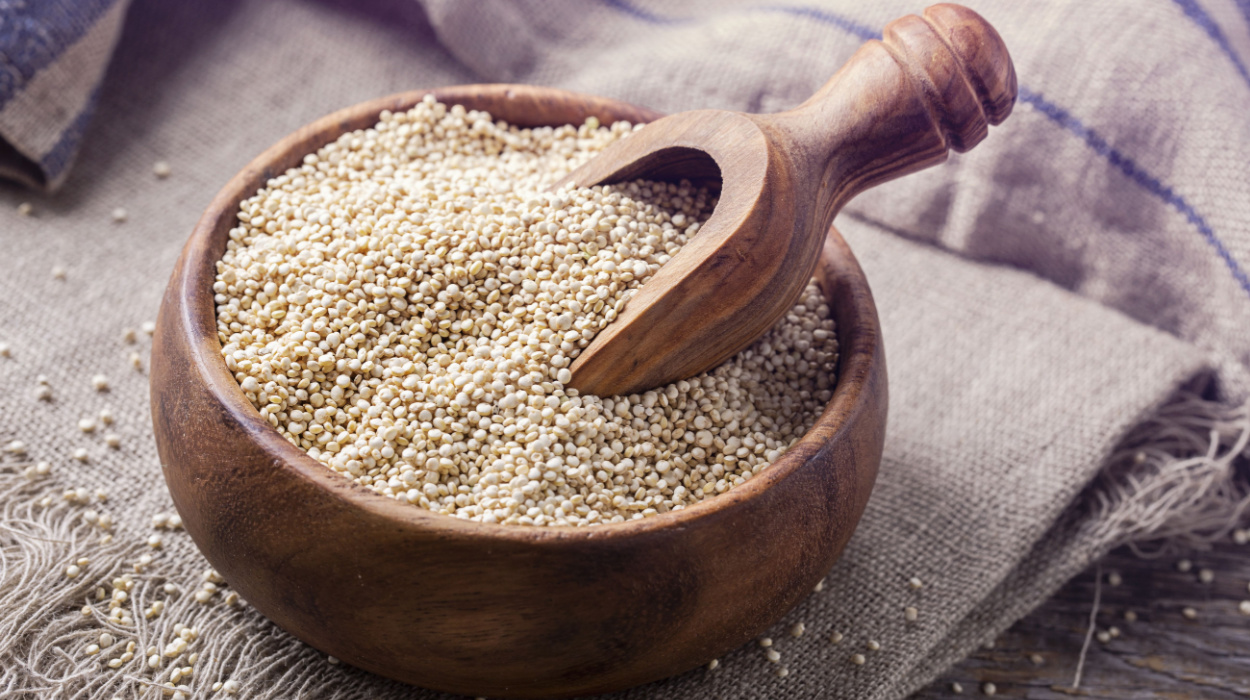
Quinoa is undoubtedly a nutritious grain with various health benefits, but is quinoa good for you to lose weight?
Quinoa’s high protein content can help curb your appetite and make you feel fuller for longer, supporting weight loss efforts.[1] In particular, quinoa stands out for its exceptional amino acid content, containing all nine essential amino acids. Amino acids serve as the foundational units of proteins, and they are essential for tissue repair and muscle growth. This makes it an excellent choice for those following a vegetarian or vegan diet, providing a complete protein source.
Quinoa’s complex carbohydrates provide a steady source of energy. This can be great if you want to maintain an active lifestyle during your weight loss journey. Quinoa is an excellent choice for people with celiac disease or those who suffer from a gluten intolerance because it is naturally gluten-free.
However, quinoa is relatively calorie-dense, around 222 calories per cup,[2] and portion control is crucial. How quinoa is prepared and what it’s paired with can significantly impact its effect on weight loss. If you eat quinoa with high-calorie toppings or dressings, the calorie content of your meal can increase greatly.
Ultimately, quinoa is a good diet option, but it’s vital to be mindful of portion sizes and added ingredients.
Featured Partner Offer

PhenQ
- Helps to burn fat
- Crushes food cravings
- Boosts energy and balances mood
- High-quality formula
Money Back Guarantee and Free US Shipping
How Much Quinoa Per Day To Lose Weight?
When eating quinoa for weight loss, it’s important to maintain a balanced approach and keep calorie intake in mind. The amount of quinoa you should eat daily depends on your calorie needs and lifestyle.
However, a general guideline is to aim for one to two servings (one-half – 1 cup) of cooked quinoa daily. One serving size of cooked quinoa[2] provides roughly 111 calories, 4 grams of protein, and 2.5 grams of dietary fiber.
When adding quinoa to your diet, it’s crucial to maintain an overall balance by complementing your meals with healthful foods. Fresh fruits and vegetables, abundant in essential vitamins, minerals, and fiber, should be a key part of your diet. Lean proteins, such as chicken, fish, and legumes, provide the essential nutrients for muscle growth and overall health. Complementing your diet with healthy fats, such as those found in avocados, nuts, and olive oil, supports nutrient absorption and overall health.
It’s also important to remember weight loss rates can vary significantly for different people due to factors like metabolism and genetics. However, sticking to a balanced, hypocaloric diet and an active lifestyle with regular exercise generally supports losing weight efficiently and effectively.
Eating quinoa alone won’t target specific areas for fat loss, like belly fat. However, combining it with healthy food choices can support this. If you want additional support with fat burning, consider looking at supplements that can support your weight loss journey.
Which Quinoa Is Best For Weight Loss?
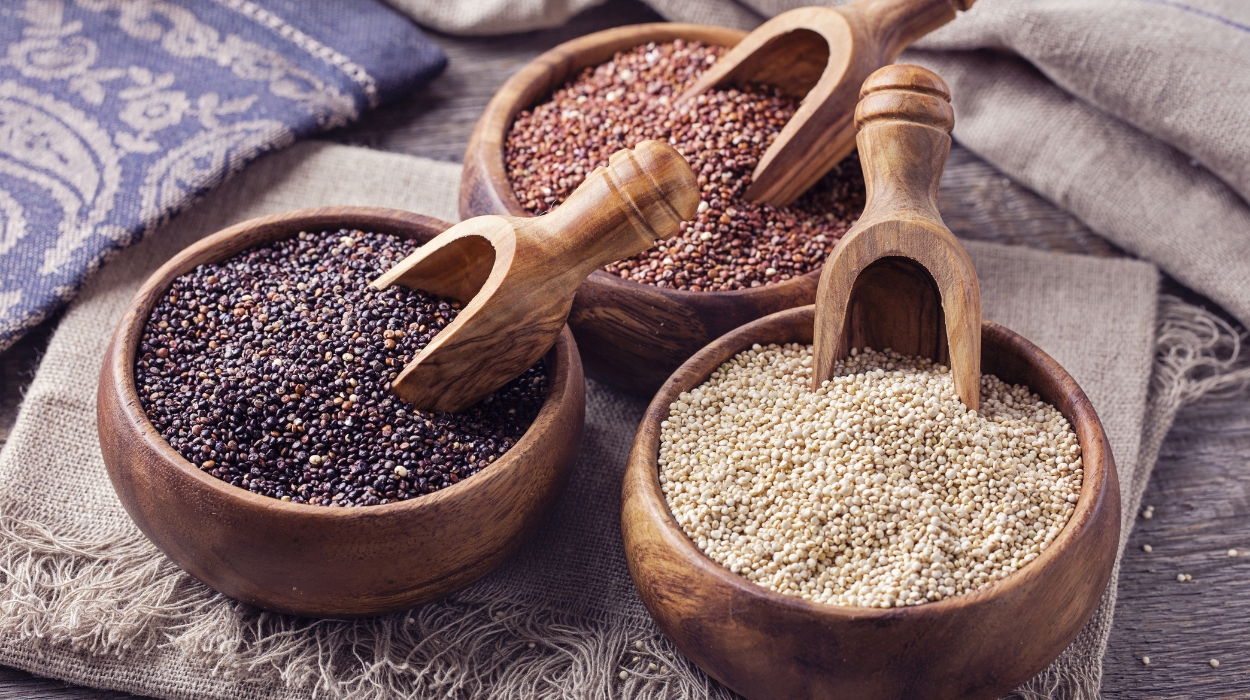
There are three main varieties of quinoa: white quinoa, red quinoa,[3] and black quinoa. While all varieties are nutritionally rich and delicious, black quinoa[4] has the highest protein and fiber content. However, white quinoa[5] has the highest iron content and boasts the lowest fat content out of the three varieties. It’s important to note that while these differences exist, they are relatively minor. Therefore, the ideal choice depends on your specific nutritional needs and weight loss goals.
All types of quinoa boast a high nutrient density and low glycemic index. The glycemic index measures how quickly food affects blood sugar levels, and low glycemic foods support stable blood sugar levels. This is particularly beneficial if you’re looking to shed excess pounds. By preventing rapid spikes and crashes in blood sugar, quinoa prevents food cravings. It will supply you with a consistent energy level throughout the day, which can greatly benefit weight loss.[6]
There are many other health benefits to consuming quinoa aside from weight loss. It benefits those with[7] anemia, osteoporosis, diabetes, dyslipidemia, and celiac disease. Research shows quinoa supports digestive health[8] thanks to its fiber, which supports regular bowel movements and overall gut health. Research also shows quinoa’s significant benefits for heart health.[9] Consuming quinoa has been linked to smaller waistlines, fat loss, and reduced cholesterol, all of which are risks for heart disease. Also, quinoa is high in antioxidants,[3] which have been scientifically linked to supporting heart health.[10] These antioxidants help reduce oxidative stress and inflammation, two significant contributors to heart disease.
While their nutritional profiles are similar, small taste and texture differences differentiate quinoa types. Black and red quinoa, for example, offer distinct, nuttier flavors and a chewier, heartier texture than white quinoa. On the other hand, white quinoa has a milder flavor and tends to be a lot fluffier when cooked. Ultimately, the ideal type will depend on your personal preferences and the specific flavor and texture that you prefer.
Featured Partner Offer
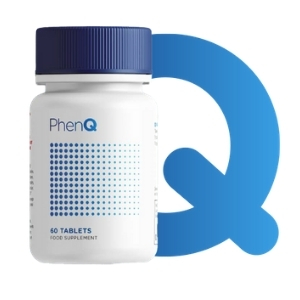
How To Eat Quinoa For Weight Loss?
Quinoa is a versatile and easy-to-prepare food that can be added to many recipes, such as salads, soups, stews, casseroles, and baked goods. Here are some ideas on how to eat quinoa for weight loss:
- Instead of water, cook quinoa in vegetable broth to add extra flavor and nutrients.
- Mix quinoa with roasted vegetables, such as sweet potatoes, onions, and bell peppers, for a nutritious and hearty meal.
- Use cooked quinoa as a base for a protein-rich salad, such as quinoa, spinach, chicken, avocado, and almonds.
- Add quinoa to your morning breakfast smoothie for a protein and fiber boost.
- Make gluten-free and low-carb quinoa flour pancakes, crackers, and cookies for healthy snack options.
- Mix quinoa flakes with nuts, seeds, and dried fruits to create homemade granola.
Conclusion
Quinoa is a great choice to support your weight loss journey while also providing essential nourishment for your body. Whether you prefer red, black, or white quinoa, each type boasts its unique flavor, making it a versatile addition to your diet.
As a complete protein source, quinoa fuels your body with essential nutrients and provides a steady release of energy. However, moderation is key, and portion control will ensure you have a measured approach to weight loss. Pairing quinoa with other nutritious foods will create a well-balanced diet, maximizing its positive impact on overall health and well-being.
Frequently Asked Questions
Eating quinoa cannot target fat loss in specific areas. It can contribute to overall weight loss when part of a balanced diet and active lifestyle, thanks to its high protein and fiber content, helping control appetite.
Yes, quinoa can support weight loss when incorporated into a balanced diet, as its high protein and fiber content can help reduce food cravings and support weight management.
For weight loss, eat quinoa in moderation, typically around one-half of a cup per serving. Portion control and balance with other healthy foods are essential for effective weight management.
Incorporate quinoa into your meals throughout the day to support weight loss. It can be part of breakfast, lunch, or dinner to keep you fuller for longer and maintain a balanced diet.
Resources
- Leidy, H.J., Clifton, P., Astrup, A., Wycherley, T.P., Westerterp-Plantenga, M.S., Luscombe-Marsh, N.D., Woods, S.C. and Mattes, R.D. (2015). The role of protein in weight loss and maintenance. The American Journal of Clinical Nutrition, [online] 101(6), pp.1320S1329S. doi:https://doi.org/10.3945/ajcn.114.084038.
- Usda.gov. (2023). FoodData Central. [online] Available at: https://fdc.nal.usda.gov/fdc-app.html#/food-details/168917/nutrients.
- Usda.gov. (2023). FoodData Central. [online] Available at: https://fdc.nal.usda.gov/fdc-app.html#/food-details/528159/nutrients.
- Usda.gov. (2023). FoodData Central. [online] Available at: https://fdc.nal.usda.gov/fdc-app.html#/food-details/2174448/nutrients.
- Usda.gov. (2023). FoodData Central. [online] Available at: https://fdc.nal.usda.gov/fdc-app.html#/food-details/2177543/nutrients.
- Zafar, M., Mills, K., Zheng, J., Peng, M., Ye, X. and Chen, L.L. (2018). Low glycaemic index diets as an intervention for obesity: a systematic review and meta‐analysis. Obesity Reviews, [online] 20(2), pp.290–315. doi:https://doi.org/10.1111/obr.12791.
- Semra Navruz-Varli and Nevin Şanlıer (2016). Nutritional and health benefits of quinoa ( Chenopodium quinoa Willd.). Journal of Cereal Science, [online] 69, pp.371–376. doi:https://doi.org/10.1016/j.jcs.2016.05.004.
- Graf, B.L., Patricio Rojas-Silva, Rojo, L.E., José Delatorre-Herrera, Baldeón, M.E. and Raskin, I. (2015). Innovations in Health Value and Functional Food Development of Quinoa (Chenopodium quinoaWilld.). Comprehensive Reviews in Food Science and Food Safety, [online] 14(4), pp.431–445. doi:https://doi.org/10.1111/1541-4337.12135.
- Karimian, J., Abedi, S., Shirinbakhshmasoleh, M., Farzan Moodi, Vihan Moodi and Ghavami, A. (2020). The effects of quinoa seed supplementation on cardiovascular risk factors: A systematic review and meta‐analysis of controlled clinical trials. Phytotherapy Research, [online] 35(4), pp.1688–1696. doi:https://doi.org/10.1002/ptr.6901.
- Jain, A., Neelesh Kumar Mehra and Swarnakar, N.K. (2015). Role of Antioxidants for the Treatment of Cardiovascular Diseases: Challenges and Opportunities. Current Pharmaceutical Design, [online] 21(30), pp.4441–4455. doi:https://doi.org/10.2174/1381612821666150803151758.
More from Weight Management
-
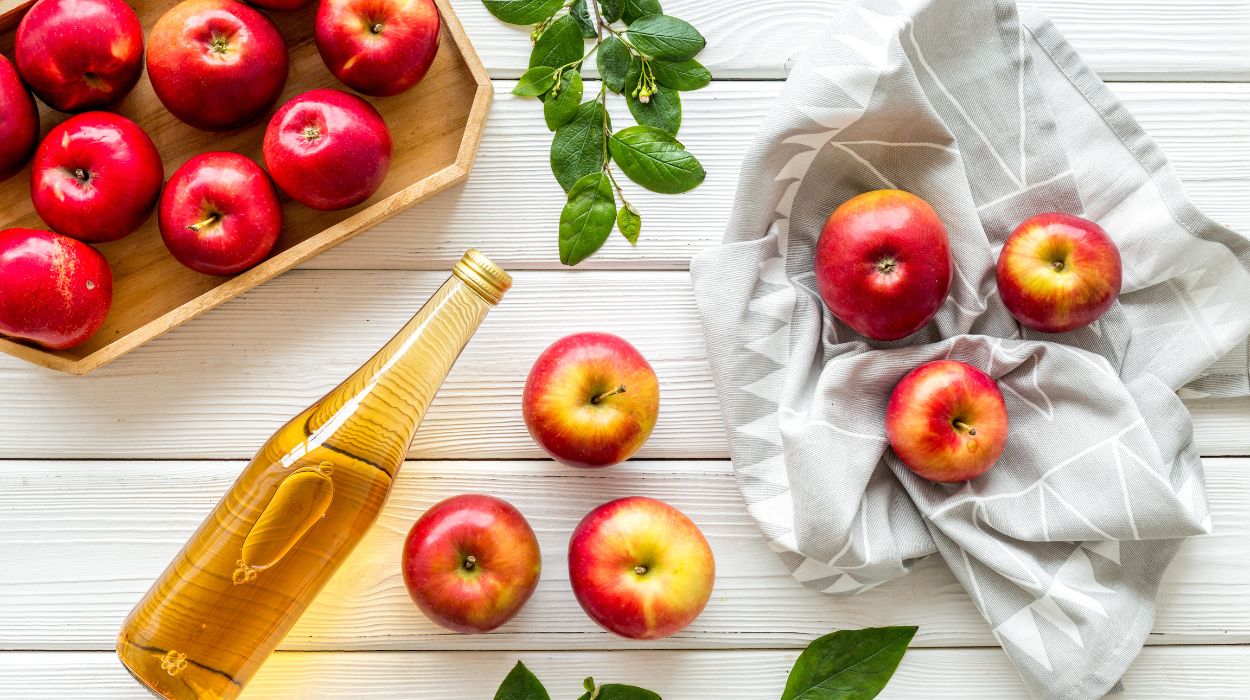
How To Drink Apple Cider Vinegar For Weight Loss In 1 Week In 2024
January 10, 2024
Taking apple cider vinegar has become a sensation for its supposed health benefits, despite its sour taste. Apple cider vinegar may…Read more -
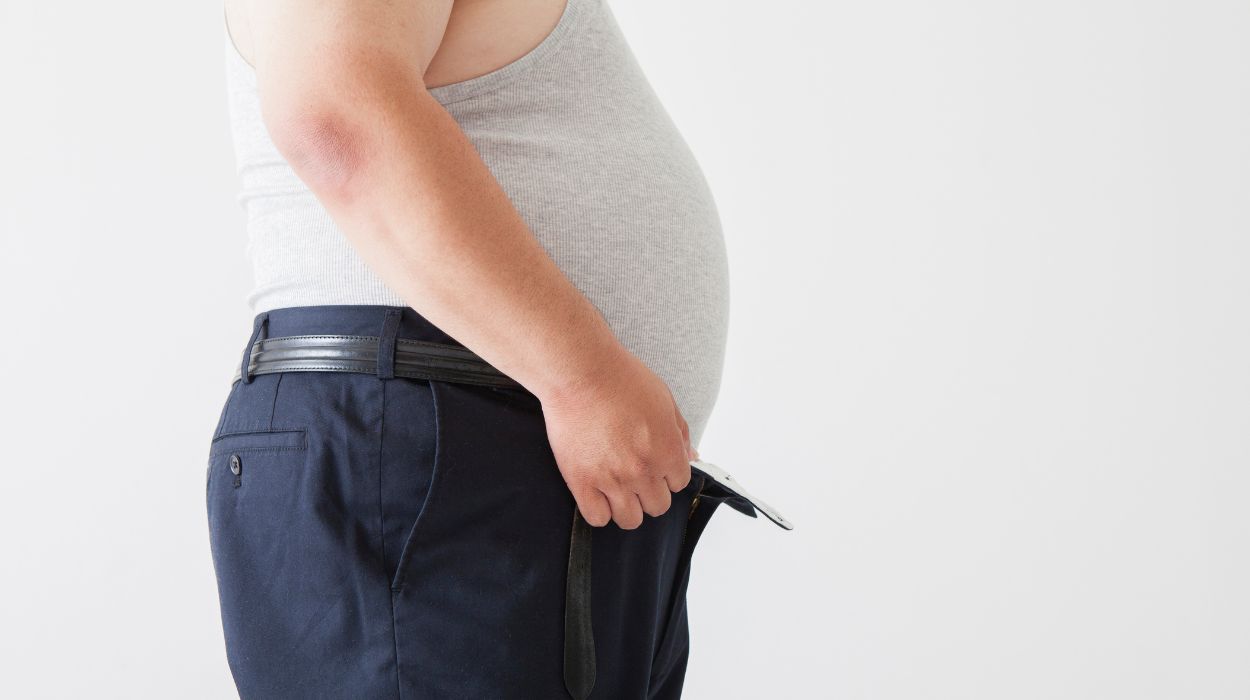
How To Lose Belly Fat After 50: Here’s 10 Tips For People Over 50 To Try In 2024
December 27, 2023
Losing weight over 50 can feel challenging, especially in stubborn areas like the abdomen. As we age, hormonal changes, slower metabolism,…Read more -

How To Lose Weight With Hypothyroidism – 10 Ways You Should Try In 2024
December 22, 2023
Hypothyroidism[1] is a condition that occurs when a person has low levels of thyroid hormone, and it most often develops when…Read more -

Hypnosis For Weight Loss: Unlocking Your Mind’s Potential For Success 2024
December 20, 2023
You’ve heard about various methods and tools to achieve weight loss and you might have looked into how to get ozempic.…Read more

